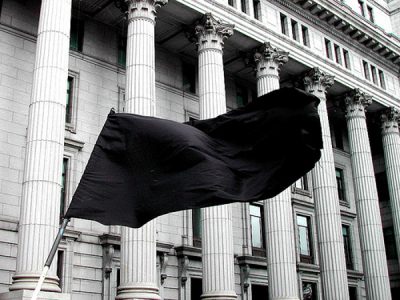In the days before November 8th I wrote the following vignette for what was supposed to be a special Cyborgology roundtable, a collection of differing viewpoints on the U.S. presidential election. For a number of reasons that roundtable was never published. Nevertheless, I am now posting what I wrote, unedited. My intent in doing this is twofold. First, it is a time-specific encapsulation of my sentiments before the event itself. It is not a reflection on what I would do given what I know now, but emblematic of the inexact and speculative nature of politics. And second, because I feel as if, regardless of the moment it emerged from, this short essay still carries a lot of weight in this post-election period. In fact, I would probably write very close to the same thing again.
Things are certainly worse than they could have been. There has already been/will continue to be a Trump inspired increase in violence against LGBT people, people read as Muslims or migrants, and people of color. Indeed, this election was by all accounts a victory for white supremacy, a watershed moment in seeming validation of unabashed racism. But, white supremacy did not begin here, and it certainly won’t end here. President Obama has deported over 2.5 million people over his two terms. The police have murdered and continue to murder black and brown people with little or no consequences. The NSA is quite publically spying on you. And, voter suppression, gerrymandering, and the electoral college (as I outline below) have us beholden to the second president in 20 years elected despite losing the popular vote. Much of the shock at the results of November 8th, therefore, demonstrates an all too common insularity from the racism, sexism, transphobia, and jingoism that pervades the day-to-day lives of many people. Would a Clinton presidency have rectified any of the Obama administration violences? According to her own intentions, seemingly not. What is needed today, however, is not ceaseless speculation, third party blaming, or a return to normalcy. When normal means state sanctioned murder, the catastrophic erosion of privacy, and the overall precarity of marginalized lives, it is the status quo that must be combatted.
On (not) Voting
Voting is political technology. By this I don’t only mean to emphasize the machines themselves, those loose constellations of aesthetically distressing buttons, levers, and touchpads, hemmed in by fabric and metal, stoically housed, commanding gravity. I also don’t only mean the speculative mathematics of voting, its computational grounding in polling data, identarian trends, party affiliation, or otherwise (though its perceived facticity and ceaseless futurity are of particular interest to me, if not to this piece). Instead I aim to orient each towards voting as a technique of production, one in service of more than the making of candidates into officeholders, but rather its function in replicating a problematic attachment to democracy.
In entering a voting booth (perhaps despite a whole host of voter suppression tactics too-cutely satirized in this New York Times videogame here) you are meant to be suddenly imbued with a kind of power that has been shamelessly hammered into your head since childhood. Voting is participation, it is the concentrated power of the individual writ large, it is responsibility. To not vote is heralded as an (un)ethical affront to the very gift of democracy.
To this, “politically neutral” get out the vote campaigns have emerged from Facebook, Google, and Twitter. Zipcar and Lyft are offering free rides to polling stations in select cities. Each of these promotions invigorates (and capitalizes on!) the self-fulfilling prophecy of voting, its masquerade as truly democratic political power. You are heard because everyone says they are listening. They’re even giving you a ride!
Voting thus replicates the very conditions of injustice immanent to American democracy that it supposedly combats, an appearance of equality masking profoundly unjust praxis. Participation, at least through the apparatus of voting, for a sizeable portion of the U.S. population is meaningless. The suppressive technics of gerrymandering ensure that a small percentage of votes will sway things. None of the candidates seek anything resembling justice. Vote and be complicit, don’t vote and you lose your right to criticize. In these things, the political technology of voting emerges as the displacement of responsibility for systemic violence from those in power to those who have very little. The voting booth is only the most apparent site of the ethical imperative that voting presages, the hopeful promise it withholds.
Lauren Berlant names cruel optimism as, “the condition of maintaining an attachment to a problematic object in advance of its loss.” Voting enacts the speculative expectation of your ability to foment change, and then blames you when nothing does. So vote. Or don’t. But barring a more subversive politics, I wouldn’t expect much.
Stephen is a PhD candidate in American Studies at Rutgers University-Newark where he advocates for ethics and ontology beyond the human through analyses of media, science, and culture. He can be found on Twitter @mcnultyenator

